Capital Update – For the Week Ending Sept. 13, 2024
In this week’s National Pork Producers Council (NPPC) Friday recap: 145-strong network of pork producers lobby lawmakers on legislative priorities; arguments presented in CAFO case; Don’t let tax provisions expire, say NPPC, U.S. Chamber; NPPC comments on Packers and Stockyards Act rule; and Harris, Trump decline support for California Prop. 12. Take a deeper dive below.
145-Strong Network of Pork Producers Lobby Lawmakers on Legislative Priorities
What happened: More than 140 pork producers from 21 states descended on Washington, DC, for NPPC’s fall Legislative Action Conference, lobbying congressional lawmakers on key pork industry issues.
Before heading to Capitol Hill to meet with members of Congress, producers heard from U.S. Agriculture Secretary Tom Vilsack and Sen. John Boozman (R-AR), the ranking member on the Agriculture, Nutrition, and Forestry Committee. Vilsack discussed getting a new farm bill, promoting agricultural trade, expanding meat processing capacity, and fixing California’s Proposition 12. Boozman spoke about Senate prospects for the next farm bill, reiterating that agriculture needs to stick together to get a farm bill done.
Producers also received an election forecast from David Wasserman, an editor at the nonpartisan election analysis newsletter The Cook Political Report with Amy Walter.
During visits with their lawmakers, producers asked members of Congress to:
- Approve a new farm bill this year that includes a provision addressing the problems caused by California’s Proposition 12. The bill also should fund programs that safeguard the nation’s food supply against threats posed by foreign animal diseases and expands foreign markets for U.S. agricultural products.
- Address the recent dramatic increase in TN visa denials by the State Department. Apparent changes in how the State Department decides visa applications have essentially blocked access to the program for producers.
- Add language in any appropriations bill to prevent the promulgation, implementation, and enforcement of a series of new Packers and Stockyards Act rulemakings that could encourage costly, unnecessary litigation and change the requirement to show harm to competition.
- Renew the Generalized System of Preferences (GSP) trade program, which gives thousands of products from 119 designated beneficiary countries duty-free access to the United States. GSP is also an important enforcement tool U.S. trade negotiators use to address market access concerns when GSP-eligible countries do not meet the eligibility criteria.
NPPC also hosted a well-attended media briefing to discuss pork industry policy priorities. The briefing featured NPPC President Lori Stevermer, President-elect Duane Stateler, Vice President Rob Brenneman, Immediate Past President Scott Hays, and CEO Bryan Humphreys.
NPPC’s popular Baconfest reception welcomed an estimated 1,000 attendees from Capitol Hill, federal agency, and embassies.
Why it matters: NPPC’s biannual legislative fly-in is an important opportunity for its members to help advance various issues of importance to the U.S. pork industry and for policymakers to learn about the many benefits the industry provides in their districts and throughout the country.
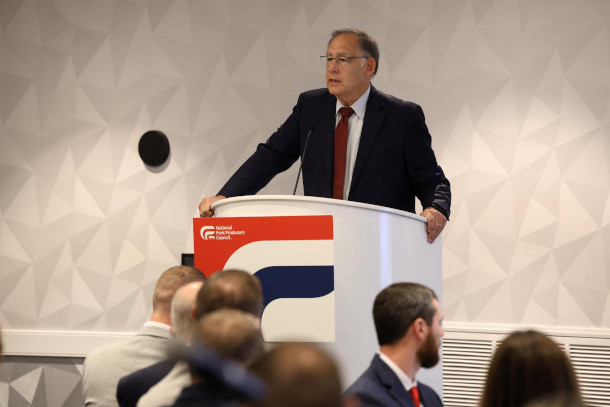
Sen. Boozman speaks with 145 pork producers in Washington.
Capitol Hill staffers learn about California Prop. 12 and enjoy bacon donuts at the “Post Prop. 12 America food truck.”

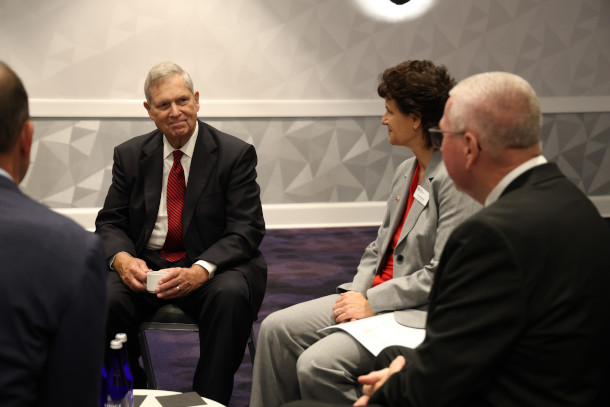
Sec. Vilsack speaks with NPPC officers Lori Stevermer, Duane Stateler, Rob Brenneman, and Scott Hays.
NPPC board member Ed Reed (left) and Michigan Pork Producers Association CEO Mary Kelpinski (right) meet with Senate Agriculture Committee Chairwoman Debbie Stabenow (D-MI).
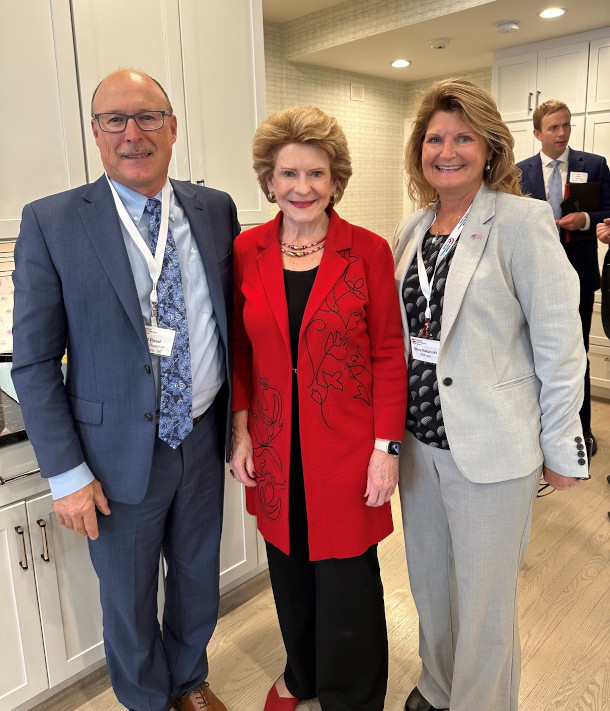
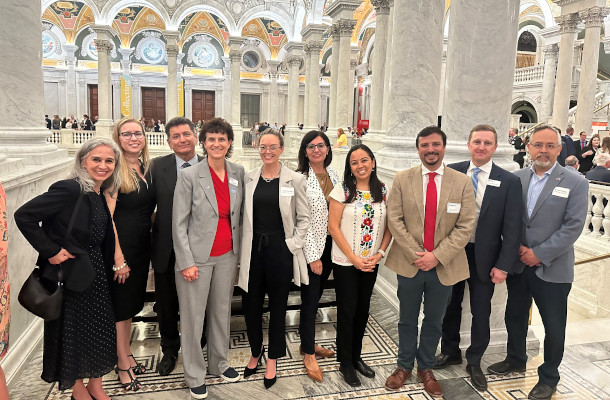
NPPC President Lori Stevermer, CEO Bryan Humphreys, and Vice President of Government Affairs Maria C. Zieba at Baconfest with representatives from Mexico, Italy, Canada, Chile, and the Inter-American Institute for Cooperation on Agriculture.
Arguments Presented in CAFO Case
What happened: Attorneys for NPPC represented a coalition of livestock and agriculture groups Thursday at oral arguments before the U.S. Court of Appeals for the Ninth Circuit in San Francisco in a case brought by activist groups seeking to force radical changes into how the U.S. Environmental Protection Agency (EPA) regulates Concentrated Animal Feeding Operations (CAFOs).
Earlier this year, a large number of national and state activist groups led by Food & Water Watch, the Iowa Citizens for Community Improvement, and the North Carolina Environmental Justice Network, filed a lawsuit against the EPA over its denial of a petition demanding EPA to modify its regulations to require CAFOs to obtain federal permits to operate.
The groups want the so-called CAFO Rule to presume pigs and other livestock and poultry farmers are discharging into Waters of the United States (WOTUS) in violation of the Clean Water Act (CWA). They asked the California-based Ninth Circuit to remove application of the long-established and congressionally developed exclusion for agricultural storm water from animal feeding operations and instead require all CAFOs to either obtain CWA discharge permits or provide evidence they are not discharging into a WOTUS.
Such a ruling would be at odds with decisions from the U.S. Court of Appeals for the 2nd Circuit and the 5th Circuit Court of Appeals. Those courts in 2005 and 2010, respectively, found that CAFOs do not have a duty to apply for a discharge permit because the CWA covers only actual discharges, not potential discharges.
NPPC, the American Farm Bureau Federation, the U.S. Poultry and Egg Federation, and the United Egg Producers intervened in the litigation in defense of EPA and the long-standing regulations that have shaped modern livestock and poultry farming.
NPPC’s take: The U.S. pork industry has long been the progressive leader in environmental protection and sustainability of protein production. In addition to continuing a close working relationship with federal, state, and local regulators, producers have been the leaders in developing successful practices and technologies to maximizing the efficient use of valuable manure resources to continuously improve on-farm performance and sustainability. At the same time, NPPC has successfully defended against the continued attacks by eco-activists to undermine food production in this country.
Why it matters: If successful, the activists’ lawsuit would upend livestock environmental regulations around the country, causing millions of dollars of litigation, fines, and challenges to individual hog farmers and setting the industry back decades.
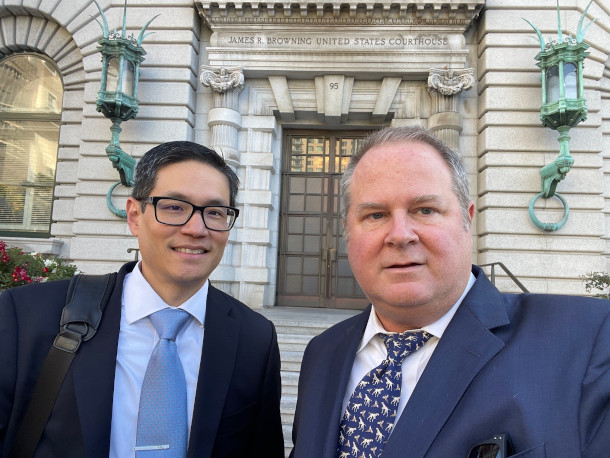
NPPC’s Chief Legal Strategist Michael Formica (right) and Crowell & Moring LLP’s David Chung at the 9th Circuit courthouse in San Francisco.
Don’t Let Tax Provisions Expire, Say NPPC, U.S. Chamber
What happened: NPPC recently joined the U.S. Chamber of Commerce in a letter to Congress urging lawmakers and the next administration to prevent tax increases that will take effect at the end of 2025, absent legislative intervention. Several tax provisions in the Tax Cuts and Jobs Act (TCJA) critical to pork producers are slated to expire next year.
Among those provisions are the:
- Bonus depreciation, which allows the cost of qualified property to be deducted in the year it is placed into service rather than depreciated over several years. The TCJA increased the amount that can be deducted to 100% of the cost but that is set to phase out to zero by 2027.
- Estate tax exemption, which was increased to $11.2 million per individual (indexed for inflation) under TCJA. The value of estates that exceed that amount is subject to a 40% tax when passed to an heir. The amount is set to revert to pre-TCJA levels at the end of 2025.
- Qualified business income deduction (Section 199A), which allows a 20% reduction in certain business income for determining federal tax liability. It will expire at the end of 2025.
Additionally, several agricultural groups, including NPPC, briefed House Ways and Means Committee staff on the effects of the expiring TCJA tax provisions. NPPC’s Christina Banoub, manager of competition, labor, and tax issues, discussed the estate tax exemption, Section 199A, bonus depreciation, capital gains taxes, and the step-up in basis. Under the current tax code, the step-up in basis allows the value of an inherited asset to be “stepped up” to its current market value, if it has appreciated over time. That step-up in basis minimizes the capital gains tax owed when the asset is later sold.
NPPC’s take: NPPC continues to ensure the tax provisions they rely on are protected and is advocating for further tax changes that will benefit the pork industry. NPPC is also working with a leading accounting and food and agriculture consulting firm to create an in-depth analysis of the tax provisions most critical to producers. The study will help NPPC effectively protect and advance those provisions.
Why it matters: Pork producers rely on effective tax policy for preserving family farms. If tax provisions in the TCJA are allowed to expire, producers likely would see a substantial increase in their tax liability.
NPPC Comments on Packers and Stockyards Act Rule
What happened: NPPC submitted comments in opposition to the “Fair and Competitive Livestock and Poultry Markets” proposed rulemaking by the U.S. Department of Agriculture’s Agricultural Marketing Service (AMS) related to unfair practices under the Packers and Stockyards Act (PSA).
The rule, NPPC noted, uses vague and overly broad language that will create substantial and unnecessary uncertainty for the pork industry, which could result in harmful and costly litigation, especially since the proposal covers independent hog farmers engaged in contract production and pork processors. The uncertainty and risk of litigation could limit market opportunities at a time when many producers are still beginning to emerge from the historic economic losses of the past two years.
NPPC also pointed out that the proposed rule exceeds USDA’s statutory authority by seeking to eliminate the need to prove “harm to competition,” an element of PSA claims that courts repeatedly have held is required. Additionally, Congress explicitly rejected an amendment to the 2008 Farm Bill that would have eliminated the requirement and has repeatedly chosen not to remove it.
Finally, the majority of safeguards in the proposed PSA rule already are covered by existing antitrust, anti-discrimination and other state and federal laws, said NPPC.
NPPC’s take: Pork producers rely on, and NPPC supports, proper enforcement of the PSA to ensure competitive pricing opportunities and free and fair markets. While NPPC appreciates that AMS intends for the proposal to promote fair and competitive markets, it is more likely to negatively impact pork producers, including through an increase in frivolous and costly litigation. NPPC is ready to work with USDA on regulations that help ensure full enforcement of the PSA in a way that does not unduly burden the pork industry and helps protect market innovation for everyone’s benefit.
Why it matters: The PSA was enacted to protect competition in the meat and poultry industries, ensuring fair markets and competitive pricing opportunities. Removing the requirement to show anticompetitive harm, combined with the proposal’s vague and broad language, may subject swine contractors, independent producers using production contracts, and packers to burdensome and costly litigation.
Harris, Trump Decline Support for California Prop. 12
What happened: The American Farm Bureau Federation published written responses to questions posed to Vice President Kamala Harris and former President Donald Trump on issues of importance to rural America.
When asked about a patchwork of state regulations, neither presidential candidate supported California Prop. 12.
The Harris campaign said they “will fight to reduce barriers and make it easier for farmers, ranchers, and other small business owners across the country to earn a living and support a family off their hard work.”
The Trump campaign provided a more forceful dissent of Prop. 12, saying, “I will use all authority under the Constitution and U.S. law to stop efforts by California — or other states — that hurt American farmers in other states. I will also direct the Department of Justice and the Department of Agriculture to actively monitor — and strongly oppose — any further efforts to limit the ability of American farmers to sell their products anywhere in this great country.”
NPPC’s take: Regardless of who is elected president, NPPC will continue to engage with the new administration to fight against damaging and far-reaching regulations like Prop. 12. NPPC’s message to all the candidates is the same — we must fix Prop. 12.
Why it matters: Though a rare occurrence when the Biden-Harris administration and former President Trump agree on policy, the bipartisan opposition to Prop. 12 continues to grow. It features some of the most respected voices in agriculture policy, including Secretary Vilsack, House Agriculture Committee Chairman Glenn “GT” Thompson, and Ranking Member Boozman, and more.